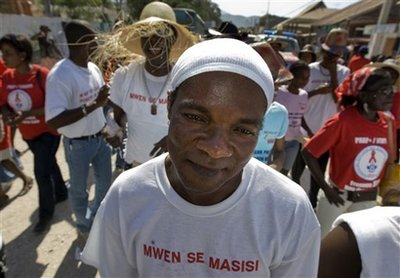| @wehaitians.com | |
No one writes to the tyrants | |
HistoryHeads/Not Just Fade Away |
| Correspond with us, including our executive editor, professor Yves A. Isidor, via electronic mail: |
| letters@wehaitians.com; by way of a telephone: 617-852-7672. |
| Want to send this page or a link to a friend? Click on mail at the top of this window. |
|
 |
|
| Posted Sunday, November 30, 2008 |
| Openly homosexual men proudly paraded the streets of Haiti |
| By Jonathan M. Katz, Associated Press Writer |
|
|
|
 |
|
| A man, wearing a T-shirt declaring 'I am gay,' dances during a march marking World AIDS Day in Saint Marc, Haiti, Sunday, Nov. 30, 2008. Haiti, a nation of 9 million, remains the most affected by HIV in the Caribbean, itself the region with the highest infection rate outside Sub-Saharan Africa.(AP Photo/Ramon Espinosa) More Images / Related Text: When blame is again unjustly assigned to Haitians for the pandemic, AIDS |
| Wehaitians.com, the scholarly journal of democracy and human rights |
| More from wehaitians.com |